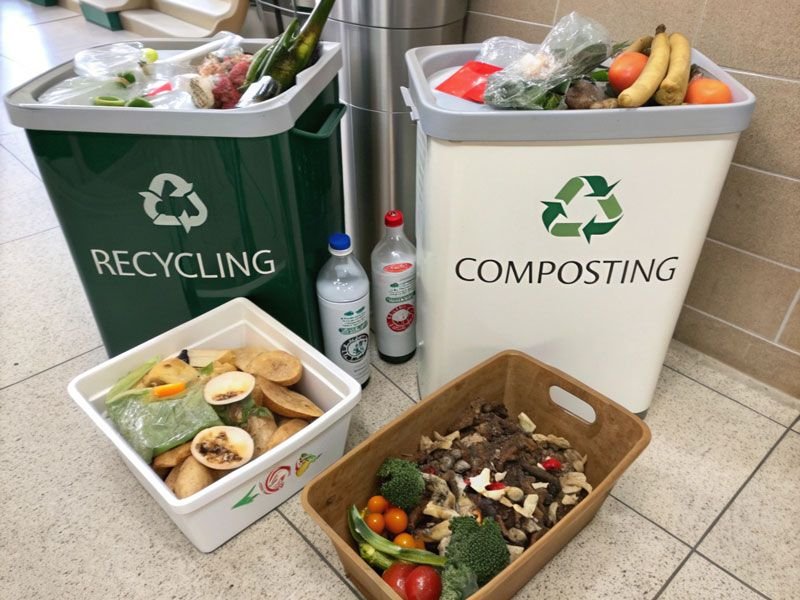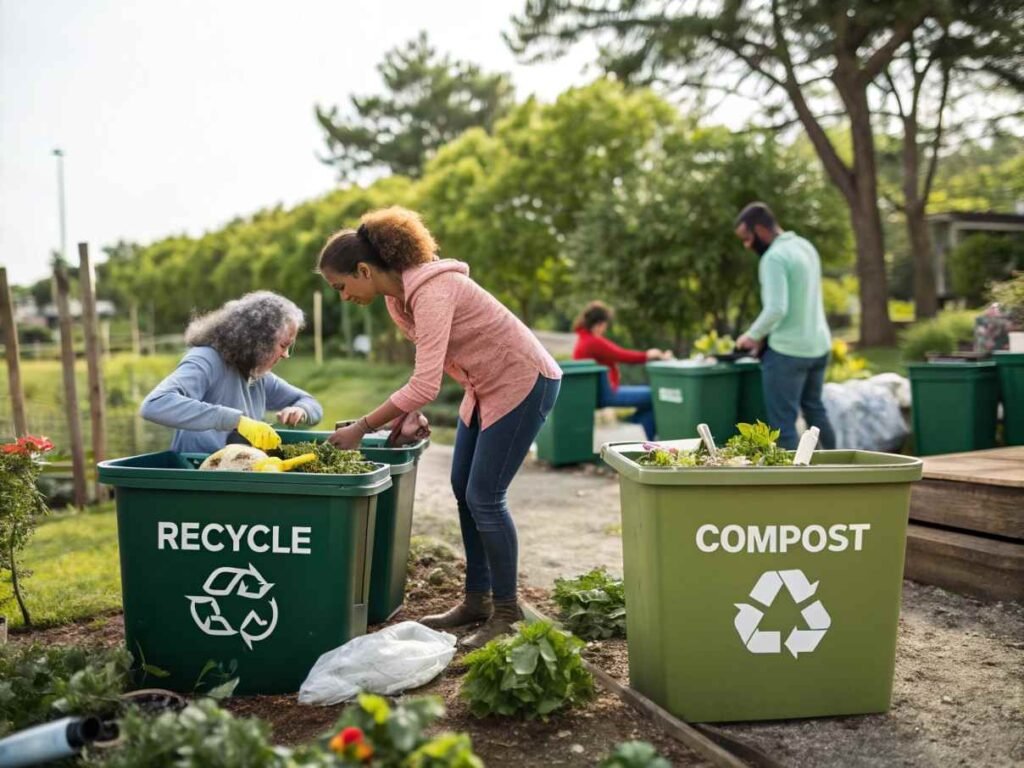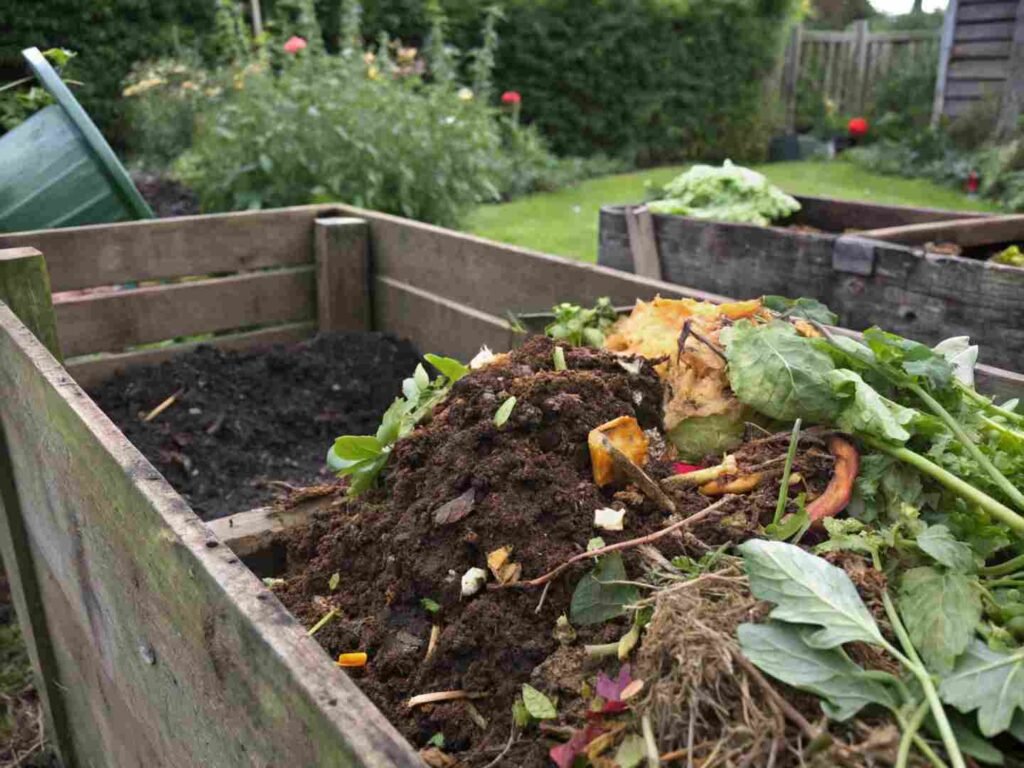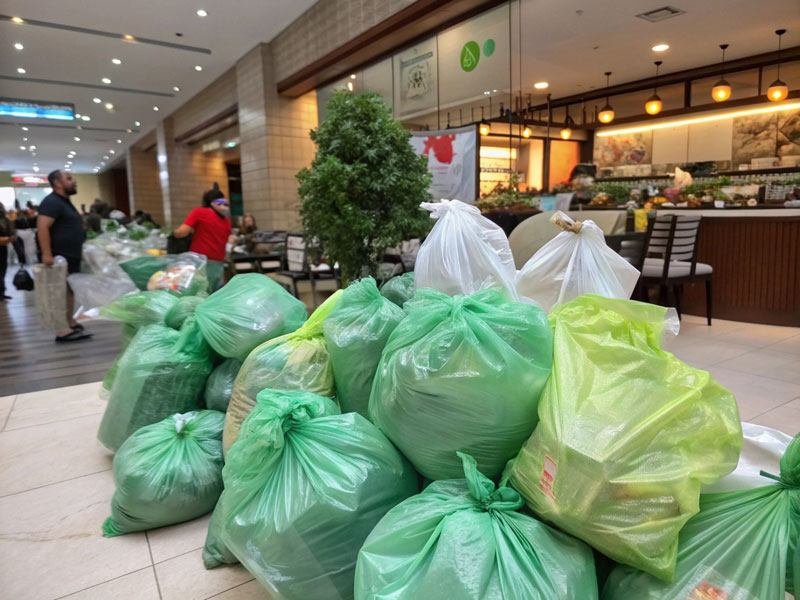"Where do I put my leftover pizza box?" "Can 'biodegradable' cups go in my backyard compost bin?" "Do I need to remove the plastic window on an envelope to recycle it?" When pursuing a sustainable, zero-waste lifestyle, properly disposing of waste is a crucial question. Recycling or composting is a key one. Both methods reduce landfill waste, but they work differently. Which is right for us?
As a manufacturer with many years of experience in compostable bags, I understand that the answer isn't absolute. Recycling and composting complement each other, not compete. Getting the right materials to the right place for disposal is crucial.
This article goes beyond the basics of recycling and composting. We'll delve into the tricky gray areas, explain the whys behind the rules, and provide practical steps from scratch. Hopefully, after reading this, you'll be able to confidently handle every piece of trash in your home and become a household waste management expert.

What Are Recycling and Composting?
- Recycling is the process of collecting and processing waste that cannot be reduced or reused, transforming it into new products for reuse.
- Composting is the process of microbial decomposition of organic matter under controlled conditions of temperature, moisture, and oxygen. The resulting product can be composted and contributes to soil nutrients.
Recycling converts inorganic materials for reuse;
Composting converts organic waste into soil enrichment.
Both reduce landfill waste but are suitable for different types of waste.
Products: Recycling vs. Composting
Here’s a clear comparison of recycling vs composting across key factors:
| Aspect | Recycling | Composting |
|---|---|---|
| Materials | Plastic, paper, glass, metal | Food scraps, yard waste, compostable bags |
| Process | Collect, sort, clean, remanufacture | Collect, mix, decompose into fertilizer |
| Environmental Impact | Saves 70% energy for plastic (EPA) | Cuts 20-30% landfill waste, lowers methane (EPA) |
| Equipment | Recycling bins, bags | Compost bin, compostable bags |
| Difficulty | Relies on municipal systems, simpler | Requires home management, more effort |
| Timeline | Weeks to months for processing | 1-6 months for decomposition |

Products: Recycling vs. Composting
Correctly sorting waste is critical for effective recycling vs composting. Here’s a breakdown:
Recyclable Items
- Plastic: Bottles, containers with recycling symbols (1-7), cleaned of residue.
- Paper: Newspapers, cardboard, office paper (no food contamination).
- Glass: Bottles, jars (remove lids).
- Metal: Aluminum cans, tin cans.
- Tip: Check local recycling rules, as some materials (e.g., soft plastic bags) may not be accepted.
Compostable Items
- Food Scraps: Vegetable peels, coffee grounds, eggshells, bread crumbs.
- Yard Waste: Leaves, grass clippings, small branches.
- Other: Uncoated paper towels, compostable bags (like OrizonBio’s biodegradable bags).
- Caution: Avoid composting meat, dairy, or oily foods to prevent odors and pests.
Common Mistakes:
- Recycling: Greasy pizza boxes or contaminated plastics can’t be recycled.
- Composting: Non-compostable plastics, even if labeled “biodegradable,” need certification (e.g., ASTM D6400).
How Should Items in the “grey Area” Be Handled?
| Item | Judgment | Reason & Instructions |
|---|---|---|
| The Pizza Box | Sort Carefully | Oily parts cannot be recycled as grease damages paper fibers. Clean lid can be torn off and recycled. Greasy bottom should be composted as “browns.” |
| The Disposable Coffee Cup | Usually Trash | Most have a plastic lining (polyethylene) that prevents recycling and composting. A classic case of wish-cycling. |
| The "Eco-friendly" Plastic Trap | Be Extremely Cautious | Items labeled “biodegradable” or “compostable” should not go in recycling. Most require industrial composting, not suitable for home composting. |
| Envelope with Plastic Window | Partial Recycling | Tear off the plastic window, recycle the paper part, and trash the plastic. |
| Tetra Pak (Milk/Juice Cartons) | Check Local Guidelines | Made of mixed materials; requires specialized recycling facilities. Rules vary by location. |
| Paper Towels/Napkins | Compostable if Clean | If not contaminated with grease or chemicals, they can be home composted. |
| Food-Soiled Aluminum Foil | Depends on Condition | Lightly soiled foil can be washed and recycled. Heavily soiled foil should be thrown away. |

Why are recycling and composting necessary?
Contamination is the recycling industry's number one enemy. At material recovery facilities (MRFs), machines and workers must rapidly sort tons of material. Problems arise when the wrong materials get in:
Food scraps: Grease and liquids can soak into paper and cardboard, damaging their fiber structure and preventing them from being regenerated into high-quality recycled paper. A greasy pizza can ruin an entire bundle of clean newspapers.
The wrong plastics: Adding low-value, difficult-to-process plastics like plastic bags or styrofoam to the composting process can entangle sorting equipment, reducing overall recycling efficiency and the quality of the final product.
Home composting blacklist
The key to successful home composting is maintaining a healthy ecosystem and a balanced carbon-to-nitrogen ratio. Some things you absolutely shouldn't put in:
Meat, fish, dairy products, and oils: These produce a strong odor as they decompose and attract pests like rats and flies. They can also harbor pathogens, making them very dangerous.
Disease-stricken plants: Plant pathogens and fungal spores may survive the cool environment of compost, and if you use this compost to nourish your garden, you are spreading disease.
Environmental Impact: Compostable Vs Recyclable
Both recycling and composting offer significant environmental benefits, but their impacts differ:
- Recycling:
- Resource Conservation: Per the EPA, recycling plastic saves 70% of production energy, and paper recycling cuts tree harvesting by 40%.
- Pollution Reduction: Keeps plastics out of oceans and landfills.
- Limitations: Recycling is energy-intensive, and some materials (e.g., mixed plastics) have low recycling rates.
- Composting:
- Landfill Reduction: Composting diverts 20-30% of household waste from landfills, reducing methane emissions (EPA).
- Soil Enrichment: Produces natural fertilizer, cutting reliance on chemical alternatives.
- Limitations: Only works for organic waste and requires time and space.
Which Is Greener?
It depends on your waste. Composting excels for food scraps, reducing landfill methane; recycling is ideal for packaging, conserving resources. Combining both maximizes impact: recycle plastics, compost kitchen scraps.

Recycling vs Composting: Tailoring Your Trash Bag Choice
Understanding recycling vs composting helps you choose the right bag:
- Recycling:
- Goal: Keep materials clean for processing.
- Bag Needs: Durable, neutral bags to avoid contamination.
- OrizonBio Advantage: Their 13-gallon and 33-gallon bags are eco-friendly, made with recycled content where possible.
- Composting:
- Goal: Ensure organic waste decomposes without plastic residue.
- Bag Needs: Certified compostable bags that break down fully.
- OrizonBio Advantage: BPI-certified bags in multiple sizes, ideal for kitchen and outdoor composting.
Pro Tip: Use dual bins in your kitchen—one with a 13-gallon standard bag for recyclables, another with a compostable bag for food scraps—to streamline sorting.
Start Recycling and Composting
1.Set Up a Home Waste Station
In the kitchen or a convenient location, set up three separate containers:
- One for recycling.
- One for composting (a small, covered food container will do the trick for temporarily storing kitchen waste).
- One for landfill waste that can't be recycled or composted.
2.Choose the Right Composting Method
- Compost Bin/Pile: The most traditional method, perfect for those with a yard.
- Vermicomposting: Ideal for apartment dwellers, it's efficient, odorless, and produces high-quality vermicompost.
- Bokashi: A Japanese-style kitchen fermentation method that can quickly process meat and dairy products.
3.Print Our Quick Checklist
We've created a PDF checklist for you, including basic categories and gray area items. [Download link prominently displayed here]. Print it out and display it on your refrigerator for your whole family to reference.
4.The "Golden Rule" for Washing Recyclables
How thoroughly should you wash your recycling? "Empty and rinse." Just make sure there's no food residue; there's no need to scrub with dish soap until it looks like new. The goal is to prevent odors and contamination of other materials.
5.Check Local Regulations
- Learn to search: Type "your city/community name + recycling guidelines" into Google.
- Tools to use: Visit websites like Earth911 or Recycle Coach and enter your zip code.
- Understand plastic codes: Learn to identify the numbers #1 through #7 on the bottom of plastic products and check local regulations to see what's acceptable.
Conclusion
Recycling and composting are two effective ways to reduce waste and protect the planet. Recycling reuses plastic and paper, while composting transforms food waste into fertile soil. Recycling and composting are powerful environmental partners, not competitors. By properly sorting your waste and using the right tools, you can achieve both.
Start today by saying "no to a plastic bag" or "reusing a glass jar," and use this guide as your definitive resource for handling the rest of your waste. Every small but positive action you take is a vote for a cleaner, healthier planet.
Source:
- https://www.epa.gov/recycle/recycling-basics-and-benefits
- https://www.epa.gov/recycle/composting-home
Last updated on August 5, 2025





